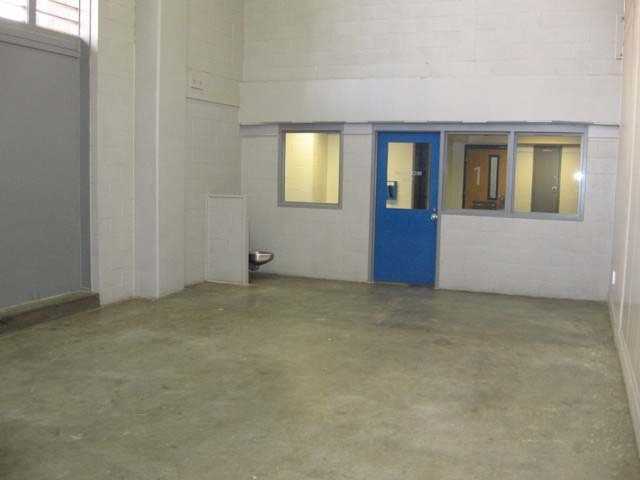Jail transfer delays cost Clark County $17 million a year and growing
For defendants in Clark County’s criminal justice system, the journey to a state prison is delayed more often than not, even after the perpetrator confesses and anticipates a shackled trip to the penitentiary.
A source of consistent delays in the court system comes from the state-run Division of Parole and Probation, which is tasked with writing pre-sentence reports.
Nevada law gives the state agency a deadline for completing the reports following a conviction: 45 days. The agency routinely misses the law’s deadline, sometimes even requesting delays of months before sentencing to finish the reports, according to public records and interviews with officials in the criminal justice system. Those reports, which are used at court sentencings, contain a defendant’s background, including factors such as criminal history, social upbringing, victim impact statements and substance abuse.
At the Clark County Detention Center, it costs county taxpayers an estimated $17.3 million each year to house inmates who sit there longer than 45 days after conviction. With an earlier sentence, they would go to a state prison or go on probation. The jail holds offenders who receive sentences of up to a year and defendants awaiting trial, and is a temporary stop for newly-sentenced felons before they go a state prison for a longer sentence.
That’s not the only reason to worry, either. County officials also have concerns that the situation will worsen in time, with a new state law that requires pre-sentence reports to be finished in an earlier time frame before sentencing. The new law’s initial phase, which kicked in this month, requires pre-sentence reports to be submitted seven days before sentencing. That time frame will increase to 21 days in October 2014.
Other impacts cannot be measured in dollars. Crime victims, after mustering up the courage to speak at sentencings, face last-minute delays in getting closure.
“This is an incredible burden on everyone in the system,” Clark County Public Defender Philip Kohn said.
IMPACT ON COUNTY
At the county jail, the number of inmates in custody more than 45 days post-conviction has been on the rise. The jail housed 401 inmates with that status in January 2012. That group peaked at 662 inmates in July 2013.
The average daily population of inmates in that group was 389 offenders in July, up from 215 inmates in January 2012, according to county data. Each inmate costs the jail $141 a day. The dollars quickly add up into the millions.
“It turns into a lot of money,” said Deputy Chief Todd Fasulo, who oversees the detention center’s operations.
The situation also has helped create a growing population at the jail even though bookings decline. Bookings have decreased by 5.5 percent since January 2013, even as the inmate population grew by 11 percent, according to a county memorandum.
The detention center can’t do anything to fix the problem, Fasulo said.
“At the end of the day, all we do is house them. … We’re at the mercy of another entity.”
The growing population has forced the county to retool its renovation plans for the detention center’s north tower. When the renovation was originally planned, detention center officials planned to move up to 750 inmates to the North Valley Complex, a separate facility, during a 33-month construction period.
Now, the county can only move 350 inmates to that complex during the construction. As a result, the county will stretch out the renovation from 33 months to 48 months. That will boost the project’s cost by $10.5 million, bringing the price to $88.6 million.
County commissioners Tuesday are scheduled to vote on the contract with Sletten Construction of Nevada, which submitted the lowest cost proposal.
‘PERFECT STORM’
Jackie Muth, deputy director of the Nevada Department of Public Safety, said the Division of Parole and Probation is trying to find ways to turn around the reports more efficiently.
But the division also has less staff to do the job. In July, the division went from having 37 pre-sentence report writers in Southern Nevada to just 27, Muth said. Northern Nevada, by comparison, lost two staffers who prepare the reports, going from a staff of 16 report writers to 14. Those changes come following an analysis the state received from an auditing firm that provided projections on caseloads in Nevada and recommended the changes. Those staffers weren’t laid off, but reassigned to other duties.
“It’s kind of a perfect storm of events,” Muth said.
In one example, a Sept. 11 sentencing was scheduled for a defendant who had pleaded guilty to felony possession of a controlled substance with intent to sell. Then Division of Parole and Probation requested in writing that the sentencing be continued until Dec. 26 or later.
“The Division apologizes for any inconvenience caused by the delay,” Parole and Probation Lt. Sheri Sneen wrote in the letter, one day before the sentencing.
The letter blamed the delay on short-staffing and a new state law that imposes an earlier deadline for submitting reports before a sentencing.
Parole and Probation didn’t get that long of a delay, and sentencing took place nine days later. The defendant got a one- to three-year prison sentence, with credit for time served in the county. The nine-day delay cost county taxpayers $1,269.
Muth said the division recently started prioritizing reports for defendants who are in custody. Now, the state is no longer requesting delays in sentencings to finish reports for that group, she said.
That came after a mid-September meeting with court officials to talk about the situation.
The division faces an additional set of deadlines for submitting the reports following a new state law. Starting this month, pre-sentence reports must be submitted seven days before sentencing. From there, the law will increase that deadline to 14 days prior to sentencing in March 2014, and 21 days prior to sentencing in October 2014.
That law was put in place because of a Nevada Supreme Court ruling that found that inaccuracies in a pre-sentence report cannot be changed after a sentencing. The change is intended to give prosecutors and defense attorneys more time to review the reports and challenge inaccuracies before sentencings.
“We are trying to implement some short-term resolutions,” Muth said. “We are evaluating right now more long-term fixes.”
Pressed for specifics, she was unable to give examples of what is being done otherwise to speed the work, calling it a streamlining of internal processes.
“It’s just a review of our business practices,” she said. “We’re working on it.”
In July, the division received 544 cases and completed 479 reports, some of which were requested from prior months. The division also requested about 200 continuances for sentencings, a figure that includes defendants who are jailed and out on bail.
While making strides to improve the turnaround time, Muth also said that due to an “unwritten understanding” with judges, the division’s staff has had more time to complete the reports.
“The 45-day rule historically has not been adhered to,” she said.
Under a law the Nevada Legislature passed in 2011, Clark County must pick up 70 percent of the division’s staffing and labor costs of completing the pre-sentence reports, work that state employees complete. In fiscal year 2013, the county’s cost was $2.5 million.
That’s another sore spot for county officials, who point out that Clark County is now paying for work that isn’t completed within the time frame required by law.
“It has a huge budget impact on us,” County Commission Chairman Steve Sisolak said. “The jail is not intended to be a prison.”
JUSTICE SYSTEM SUFFERS
Christopher Lalli, assistant district attorney for the criminal division, gives this analogy: The justice system is like a factory assembly line. Everyone has a job and if one part of it lags, a backlog develops, he said.
With the new law requiring tighter deadlines for finishing the reports, Lalli said the division needs more resources, not cutbacks.
Kohn agrees.
“It’s incredibly unfair to our in-custody clients who are hoping to get out of custody or move onto the state prison and get their sentence underway,” Kohn said.
Defendants out on bail also face delays in getting pre-sentence reports completed. In one case, a defendant drove from Texas for the sentencing, only to find out it was continued, Kohn said.
Both attorneys say the delays also are unfair for crime victims seeking closure.
“It’s just wrong on every level,” Kohn said.
Jennifer Togliatti, chief judge of Clark County District Court, said sentencing dates can be delayed two to four months out.
Even with defendants out of custody awaiting sentencing, it’s best for them to get an earlier hearing, Togliatti said.
Waiting means a longer lag time for the defendant to get help, such as referrals for substance abuse treatment programs and halfway houses, she said.
Still, she said, the Division of Parole and Probation is trying to improve.
“They’re in a tough position,” Togliatti said of the state agency. “They have 10 less report writers, and they have to get the work done and figure out how they’re going to do it.”
Contact reporter Ben Botkin at bbotkin@reviewjournal.com or 702-405-9781. Follow him on Twitter @BenBotkin1.




























